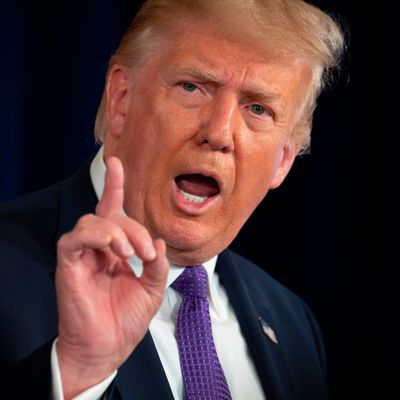
Of all the accounts we have heard of Donald J. Trump’s conduct and thinking leading to the fateful day of January 6, a new one from the New York Times’ Katie Benner may get closest to a revelation of how this strange man conceives of political life and the incessant combat it involves for him. Derived from notes taken by then–Deputy Attorney General Richard Donoghue during a December 27 phone conversation he and unnamed colleagues had with Trump, which the Department of Justice subsequently handed over to the House Select Committee investigating the Capitol riot, the story is that the legal beagles kept trying to convince the president there was zero factual or legal basis for further contesting the election, and Trump clearly did not care:
Mr. Donoghue warned that the department had no power to change the outcome of the election. Mr. Trump replied that he did not expect that, according to notes Mr. Donoghue took memorializing the conversation.
“Just say that the election was corrupt + leave the rest to me” and to congressional allies, Mr. Donoghue wrote in summarizing Mr. Trump’s response.
Likely nonplussed by this suggestion, Donoghue explained that DOJ couldn’t taint the election as “corrupt” without, you know, some evidence:
“Much of the info you’re getting is false,” Mr. Donoghue said, adding that the department had conducted “dozens of investigations, hundreds of interviews” and had not found evidence to support his claims. “We look at allegations but they don’t pan out,” the officials told Mr. Trump, according to the notes.
But Trump expressed unshakable trust in his sources, while asserting that those “saying that the election isn’t corrupt are corrupt”:
Mr. Trump castigated the officials, saying that “thousands of people called” their local U.S. attorney’s offices to complain about the election and that “nobody trusts the F.B.I.” He said that “people are angry — blaming D.O.J. for inaction.”
“You guys may not be following the internet the way I do,” Mr. Trump said, according to the document.
If you think about it, that makes perfect sense from Trump’s twisted point of view. Throughout his presidency, he thought of his angry base as “the American people,” or strictly speaking, the only segment of the population to which he paid any attention, other than as an object of vilification. Those expressing anger most vocally — like those “thousands” complaining about an election whose legitimacy he had been undermining since the spring of 2020 — were the most American of the American people. And “the internet,” of course, that great megaphone for angry misinformation, struck Trump, in this great moment of crisis, as the Voice of the People. Maybe the suits at DOJ cared about laws and facts and provable-in-court evidence. But for Trump, the noise emanating from the noisiest part of his noisy base represented a mandate. Since the people he listened to most told him exactly what he wanted to hear, he wasn’t about to let the suits, or the laws and Constitution they tediously cited, get in the way of his manifest destiny to stay in office until he tired of it.
“The internet,” the Voice of the People that is also the Voice of God, wanted an insurrection on January 6, and Trump was going to supply one. Turns out that Twitter and Reddit and Facebook warriors weren’t nearly as powerful as it seemed, which is what saved the rest of us from losing our democracy.






























